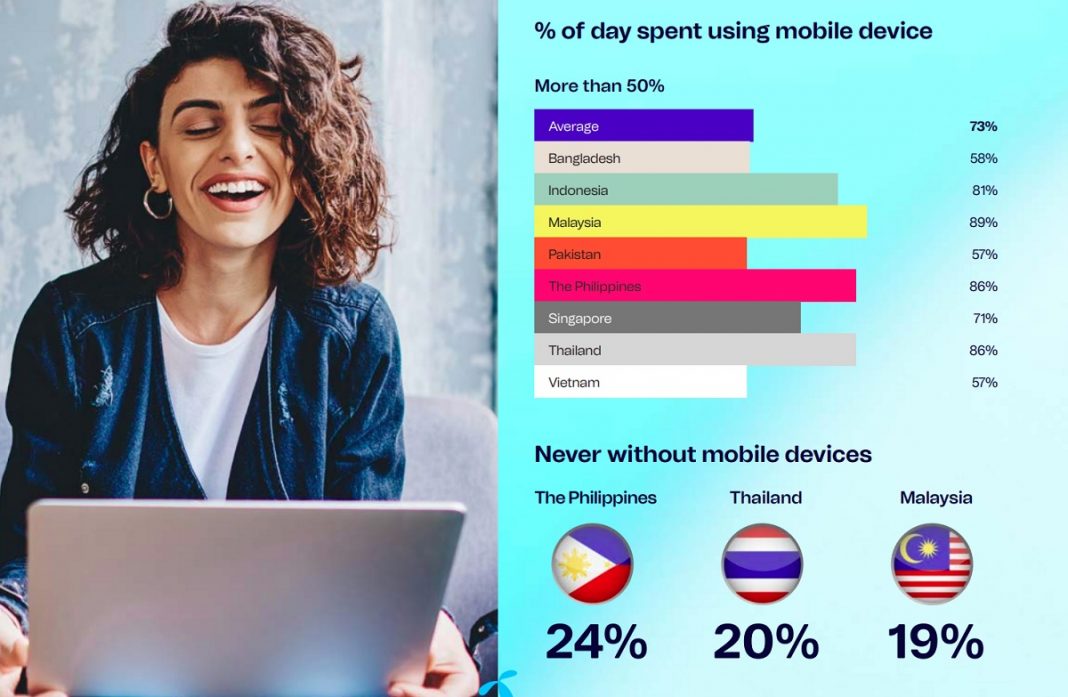A new study from telecom firm Telenor Asia has revealed that Filipinos are most likely to have their mobile on them at all times, with 24% saying they are never without it, compared to the regional average of 14%.
This result, however, is a slight reduction on 2022, when 29% indicated that they were never without their mobile device.
A whopping 86% of Filipinos spend at least half their day using their mobile device compared to 73% on average, according to the report.
The survey said Filipinos feel that mobile use positively impacts their personal lives, with 49% saying they felt it had improved their relationship with family members, compared to the regional average of 39%.
Despite the high-usage rate, 83% of Filipinos believe they have achieved a healthy balance with their mobile use. This is higher than the regional average of 77% and second only to Indonesia (85%).
The study, titled “Digital Lives Decoded”, surveyed over 8,000 mobile Internet users across Bangladesh, Indonesia, Malaysia, Pakistan, Singapore, Thailand, and Vietnam – including 1,010 from the Philippines.
The report also found that Filipinos are using their mobile devices as a tool to manage rising costs of living amid a challenging economy and high inflationary environment.
They are turning to their mobile devices to find the best deals (75%) and compare prices (74%) or accessing the numerous financial management and budgeting tools, calculators, or apps that can help manage their finances during difficult times.
The study observed that noticeable trends are becoming entrenched in how people in the Philippines use their devices. Most people (80%) continue to feel that the mobile has improved or significantly improved their relationship with family members.
Four in 5 respondents from the country indicated they have a good balance when it comes to their relationships with their mobile devices. Only 4% say their mobile use causes them to feel anxious.
Seventy-seven percent of the local respondents said mobile use has upped their productivity at work over the last five years, and 90% feel it has improved or significantly improved work quality and performance.
Almost three-quarters of respondents Philippines believed that the mobile would help them build an additional income stream (71%), while almost half (45%) believed it would help them get ahead at work, underpinning the enormous potential of mobile connectivity.
Respondents from the Philippines also anticipate the adoption of new technologies to accelerate in the workplace, with 82% indicating their organization is supportive of using generative AI for work. Over half (52%) expect the use of generative AI to increase in the next 6 months.
In an age of growing mobile use, majority (97%) of the respondents from the Philippines also shared concerns on privacy and security. Fifty five percent of respondents even stated that privacy and security are hindering the full utility of mobile devices in the course of their work.
These concerns were most prevalent for the elderly and children. Almost 9 in 10 respondents (89%) highlight concerns over the online safety of elderly family members. Concerns over children were even higher, at 95%.
Filipinos named their top concerns as being around fake news (76%), identity theft (76%) and data theft (74%).
In terms of upskilling opportunities and creating new income streams, 91% of respondents in the Philippines said they had used their mobile to learn a new skill in the last 12 months.
Selling on e-commerce platforms (56%), leveraging generative AI (52%) and social media management (47%) emerged as the most desirable skills to learn via mobile device among respondents.
Providing freelance or consultancy services emerged as the top income stream that mobile devices have created for respondents in the Philippines, further buttressing the nation’s status as a business process outsourcing (BPO) hub.
Meanwhile, 76% of Filipinos felt that their mobile use helps them live more sustainably by reducing their paper usage, affording them access to education and information, and being more informed about daily life choices, such as information about transportation options.
Petter-Børre Furberg, head of Telenor Asia, said: “Our first study came at a time when the world was emerging from the global pandemic and the pace of digital adoption accelerated. This year’s findings build on those trends as mobile usage continues to gain momentum. In 2023, we see a shift where mobile use has the greatest impact on people’s lives, with work becoming the primary driver for increasing usage, and a majority using their devices to pick up new skills.”




